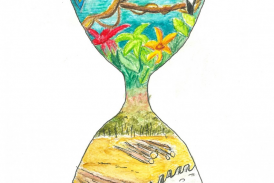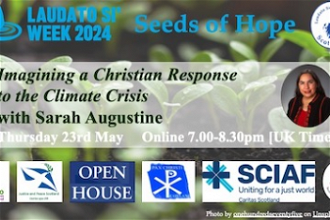Columban Competition 2020 - Are we really stewards of the earth or destroyers?

Evelyn James
Columban Competition 2020 - Tackling our Throwaway Culture
Second Prize Article
Are we really stewards of the earth or destroyers?
By Evelyn James
We are now living in a world where many people are exploiting the earth through ignorance, without paying any attention to their actions. Are we really stewards of the earth or destroyers; one may say?
The throwaway society we live in has been strongly influenced by consumerism. Pope Francis in his 2015 encyclical Laudato Si' urged that every living person on this planet should pay serious attention to environmental issues facing humanity. The Pope reprimanded that our home is beginning to look "more and more like an immense pile of filth" due to our consumerist mind-set, since we frequently discard items without any thought process.
The Book of Genesis states that God created us to be stewards of the earth and gave us responsibility to care for our planet and all species. Earth is a gift from God for all the world to share and it's our duty to protect the earth for future generations. However, we are in the process of completely destroying our 'common home' as we carelessly strip it of its resources. Even when we see the drastic effects of climate change, deforestation and many more concerns, some of us just can't seem to understand the seriousness of our actions, nor understand that it is the unprivileged communities that are suffering the most.
Pope Francis also highlighted that today's 'throwaway culture' is also reflected in our continual waste of food, stating that "food that is thrown away might as well have been stolen from the table of the poor, the hungry". There are one billion people underfed, two billion overfed and staggeringly, we still waste a third of all food produced. In the UK alone, 8.4 million people are struggling to afford to eat which is equivalent to the entire population of London. This tells us that food waste is not only affecting the world's poorest countries, but also highly developed countries like the UK. In the UK alone we throw away a staggering 460,000 tonnes of bread a year - that's the equivalent of 177 million slices a week, according to a Tearfund paper on 'Waste'. This waste could be tackled if only we could be more mindful of how much we buy, and make sure we actually use rather than making it go to waste. If food waste were a country, it would be the world's third largest emitter of greenhouse gases, behind the US and China. Surely, this puts things into context for us, especially the amount of food we are unnecessarily wasting. Donating some of that extra food to your local food bank, rather than wasting, would be a way to demonstrate stewardship, as it is our duty to feed people in need.
We humans have also developed a habit of always fitting to the latest trends and, seemingly, we enjoy buying new items on a daily basis. Items of clothing can go out of fashion within a matter of weeks, leaving garments hibernating in our wardrobes for years until we just throw them out. The amount of energy put into creating that item is wasted, as well as the fossil fuels used to create that energy. All that is left is an unreasonable amount of greenhouse gases and the calamity of climate change.
Climate change negatively affects us all, but the poorest communities are the most vulnerable. By 2030 an estimated 120 million could be pushed into poverty and an estimated 600 million more people in Africa could face malnutrition as agricultural systems break down due to climate change impacts (Statistics from Actionaid). But even after modern day activists like Greta Thunberg, David Attenborough and Chief Raoni Metuktire speak out like modern day prophets, we continue with our lavish lifestyle. We have become indifferent to the many who suffer in our world, caught up in our own lifestyles. By buying fewer new things, we could reduce this scandal. We should be helping the poor out as we are all gifted with human dignity. This makes us all equal, as we are all made in the image and likeness of God (Imago Dei). As climate change attacks their dignity, due to our careless decisions, we are obliged to help our brothers and sisters living in poverty.
We take things for granted when actually there are many in the world that are less fortunate than us. It is about time we start being more thoughtful of them. But there is still hope for us! We can still be in control of our future and the future of our brothers and sisters.
As a practical step, we can all do something in our households to reduce our consumption of Earth's resources. We need to understand that even the smallest things can make a change. Donating some of your clothes to a local charity rather than sending them to a landfill, or turning the tap off when you brush your teeth will make a difference. We will be judged by God on our behaviour as stewards, so it is essential that we start making wiser decisions before time's up. It is important that we value and care for the environment because we only have one planet and we must conserve it. No matter who we are, each and every one of us can make change happen. We can all do our bit to help our planet as we take our step on the path to true stewardship. We have to start making changes right now, before it is too late as these things have and will affect not only us but also future generations. Many small changes can lead to a big change, in regards with our food, clothing and many more. All of us need to work together and faster, to put an end to our throwaway culture.
Evelyn James is a pupil of St Mark's Catholic School in Hounslow, London.





















